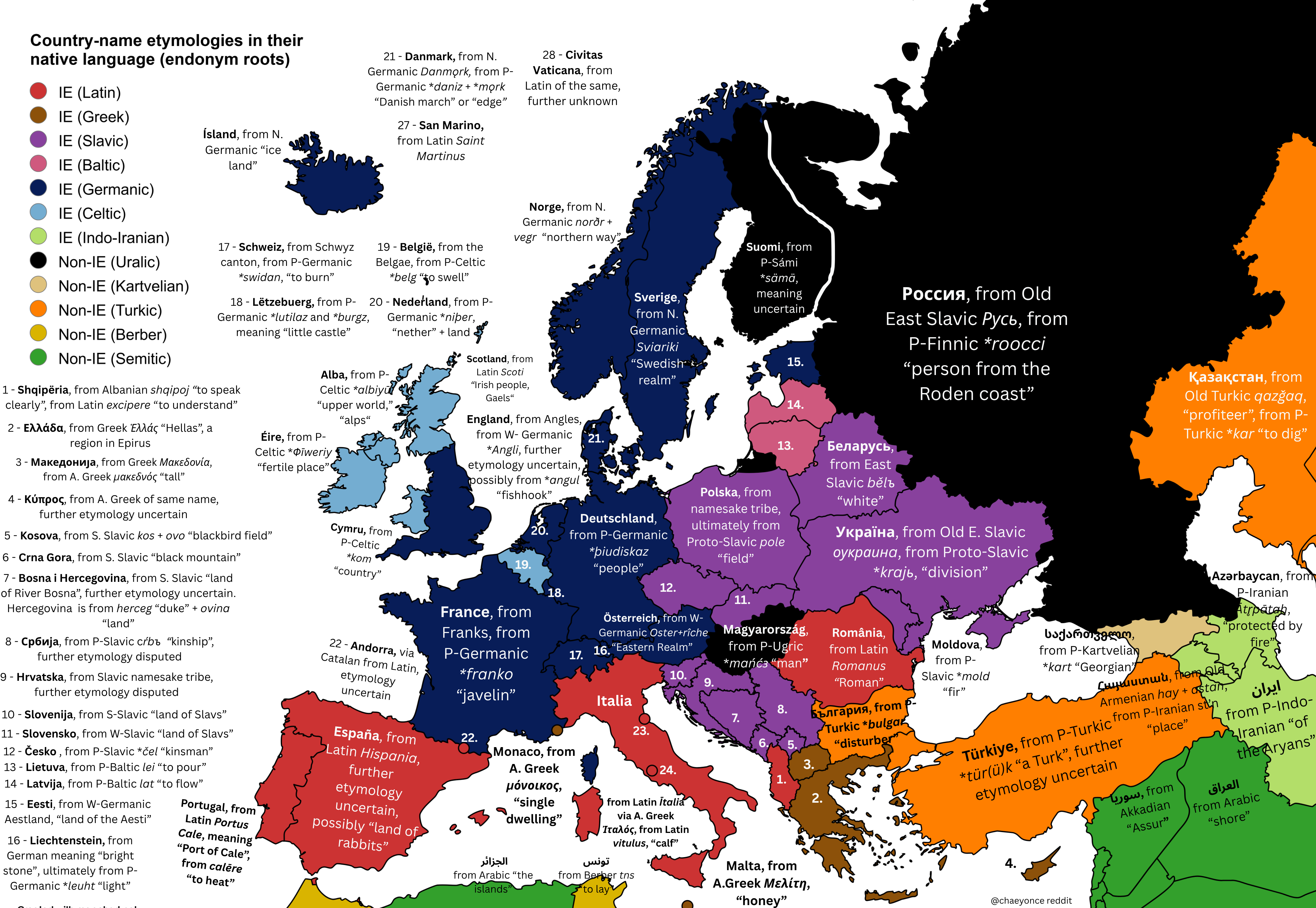European Country Name Etymologies Map


David Chen
Data Visualization Specialist
David Chen is an expert in transforming complex geographic datasets into compelling visual narratives. He combines his background in computer science ...
Geographic Analysis
What This Map Shows
This visualization, titled 'European Country Name Etymologies Map,' provides an intriguing look into the origins of the names of European countries, presented in their native languages. Each name carries a historical significance, often reflecting the cultural, linguistic, and geographical heritage of the land it represents. As you delve into this map, you’ll notice the diverse influences that have shaped these names over centuries—from ancient tribes and languages to modern-day etymological roots.
Deep Dive into Etymologies
Etymology, the study of the origin of words and how their meanings have evolved, offers a fascinating lens through which we can understand both history and culture. In Europe, country names often reveal layers of stories about the people and events that have shaped each nation's identity.
Take, for instance, the name 'Germany.' In German, the country is called 'Deutschland,' which derives from the Old High German word 'diutisc,' meaning 'of the people.' This reflects the country’s focus on its language and cultural heritage, distinguishing itself from the Latin influences of the Roman Empire.
On the other hand, consider 'Hungary,' known as 'Magyarország' in Hungarian. This name is derived from the Magyar tribes that settled in the area, showcasing the importance of tribal identity in the etymology of the nation. Interestingly, the English name 'Hungary' is believed to have originated from the Medieval Latin 'Hungaria,' which may be linked to the Huns, a nomadic group from Central Asia, despite the fact that the modern Hungarian people have little direct connection to them.
Likewise, the name 'Portugal' comes from the Latin 'Portus Cale,' referring to an ancient settlement that eventually became the modern city of Porto. The transformation of this name over time illustrates the evolution of language and geography, merging pre-Roman and Roman influences.
Each country name carries with it stories of migration, conquest, and cultural exchange. For example, 'Slovakia' derives from 'Slovak,' which is related to the Slavic peoples, while 'Ireland' comes from 'Éire,' the native Gaelic name for the island, showcasing the rich cultural heritage embedded in the language.
This map not only highlights the linguistic diversity of Europe but also provides a window into the historical narratives that shaped these nations. Understanding the etymology of country names allows us to appreciate the complex tapestry of European history, where every name has a story to tell.
Regional Analysis
When analyzing Europe regionally, the diversity of etymological roots becomes even more apparent. In Northern Europe, countries like 'Finland' (Suomi in Finnish) reflect the indigenous Sámi people and their languages, while Sweden's name derives from 'Svear,' one of the ancient tribes. In contrast, Southern Europe, with countries like 'Italy' (Italia) and 'Greece' (Ellada), showcases names that reflect ancient civilizations, with roots in Latin and Greek cultures respectively.
In Eastern Europe, countries like 'Poland' (Polska) highlight the Slavic roots, where 'Polska' means 'land of the Polans,' a tribe that once inhabited the region. By comparison, Western Europe features names like 'France,' derived from the Franks, a Germanic tribe that settled in the area. This regional analysis reveals how geography and history have intertwined to influence the names we use today.
Significance and Impact
Understanding the etymologies of country names is more than an academic exercise; it connects us to the past and informs our understanding of cultural identities today. Language is a living entity, and as cultures evolve, so do the names that represent them. Knowing the meanings behind these names can foster a deeper appreciation for the rich histories and identities of European nations.
Moreover, in our increasingly globalized world, this knowledge can have real-world implications. For example, as debates about nationalism and identity continue to unfold across Europe, a deeper understanding of the roots of country names may help to bridge cultural divides, fostering dialogue and mutual respect.
In conclusion, the 'European Country Name Etymologies Map' serves as a reminder of the intricate relationships between language, culture, and geography. As we navigate through the rich tapestry of European history encapsulated in these names, we gain insights that transcend borders and connect us all through our shared human experience.
Visualization Details
- Published
- October 30, 2025
- Views
- 6
Comments
Loading comments...